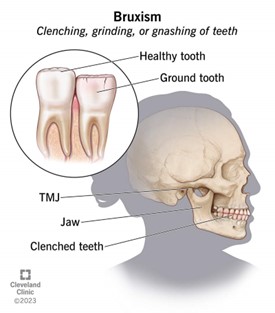Breaking Down Bruxism: What It Is, Why It Happens, and How to Stop It

Welcome back to the Spokane Dental blog, your trusted source for all things dental! This post will cover a topic that might be causing you more trouble than you realize – bruxism. Whether you're clenching your teeth during the day or grinding them at night, bruxism can take a toll on your oral health. Let’s explore what bruxism is, why it happens, and most importantly, how you can stop it.
What is Bruxism?
Bruxism is the medical term for grinding, clenching, or gnashing your teeth. It can occur during the day (awake bruxism) or at night (sleep bruxism). While occasional teeth grinding might not be harmful, regular bruxism can lead to various dental issues, from enamel and gum wear to jaw pain and headaches.
Why Does Bruxism Happen?
The exact cause of bruxism isn't always clear, but several factors are known to contribute to this habit:
1. Stress and Anxiety: High levels of stress or anxiety are the most common triggers. When you're tense, you might clench your jaw or grind your teeth without realizing it, especially during sleep.
2. Sleep Disorders: Conditions like sleep apnea can increase the likelihood of sleep bruxism. The interruptions in breathing may trigger a grinding reflex.
3. Lifestyle Factors: Habits like smoking, excessive alcohol consumption, and caffeine intake can exacerbate bruxism. Recreational drug use is also known to be associated with teeth grinding.
4. Medication Side Effects: Certain medications, especially some antidepressants and antipsychotics, can lead to bruxism as a side effect.
5. Misaligned Teeth: An abnormal bite or missing or crooked teeth can cause bruxism.
6. Genetics: If you have a family history of bruxism, you might be more prone to it yourself.
Symptoms of Bruxism
Not sure if you're a grinder? Here are some telltale signs that you might be dealing with bruxism:
- Tooth Sensitivity: Worn enamel can make your teeth more sensitive to hot, cold, and sweet foods.
- Jaw Pain: Persistent pain or tightness in the jaw muscles, especially after waking up.
- Headaches: Frequent morning headaches, particularly in the temples, can be a sign of nighttime grinding.
- Earache: Jaw pain associated with clenched teeth can actually radiate to the ear (or sometimes sinuses). Pain that feels like an earache, but isn’t actually a problem with your ear could be a symptom of bruxism.
- Worn Teeth: Flattened, fractured, chipped, or loose teeth can be a result of excessive grinding.
- Disrupted Sleep: You might wake up frequently during the night, or your partner might notice you grinding your teeth. Whether this is due to sleep apnea, bruxism, or some other cause, it is always important to bring up the topic of lack of quality sleep with Dr. Smith and/or your primary care physician.
Treatment and Prevention
If you suspect you have bruxism, it's essential to address it sooner rather than later to prevent further damage. Here are several strategies to help manage and treat bruxism:
1. Stress Management: Because stress can be a significant trigger, incorporating relaxation and stress management techniques into your daily routine can help.
2. Night Guards: Dr. Smith can custom-make a mouth guard to wear at night. This protective device cushions your teeth and prevents them from grinding against each other, reducing damage.
3. Lifestyle Changes: Cut back on stimulants like caffeine and alcohol, especially before bedtime. Avoiding these can reduce the likelihood of nighttime grinding.
4. Good Sleep Hygiene: Ensure you are getting quality sleep by maintaining a consistent sleep schedule, creating a calming bedtime routine, and making your sleep environment as comfortable as possible.
5. Orthodontic Intervention: If misaligned teeth are contributing to your bruxism, orthodontic treatments like braces or Invisalign can help correct the alignment and reduce grinding.
When to See Your Spokane Dental Team
If you suspect you have bruxism, schedule an appointment with Spokane Dental. Dr. Smith will examine your teeth for signs of grinding and may recommend a treatment plan tailored to your needs. Early intervention can prevent serious dental issues and improve your overall quality of life.
Bruxism might be a common issue, but it is one that shouldn't be ignored. By understanding the causes, recognizing the symptoms, and seeking appropriate treatment, you can protect your teeth and jaw from unnecessary wear and tear and maintain a healthy smile. If you have any concerns about bruxism or any other dental issues, Spokane Dental is here to help. Call us at (509) 822-5614 to schedule your appointment today.
Photo Credit:
https://my.clevelandclinic.org/health/diseases/10955-teeth-grinding-bruxism


Please login to publish a comment.
Comments (0)